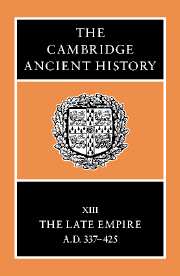Book contents
- Frontmatter
- PART I CHRONOLOGICAL OVERVIEW
- PART II GOVERNMENT AND INSTITUTIONS
- PART III THE EMPIRE: ECONOMY AND SOCIETY
- PART IV FOREIGN RELATIONS AND THE BARBARIAN WORLD
- 13 Warfare and diplomacy
- 14 The eastern frontier
- 15 The Germanic peoples
- 16 Goths and Huns, c. 320–425
- 17 The barbarian invasions and first settlements
- PART V Religion
- PART VI ART AND CULTURE
- BIBLIOGRAPHY
- Index
- Map 1: The Roman empire in the late fourth century a.d.
- Map 2: Gaul and the German frontier
- Map 3: The Balkans and the Danube region
- Map 6: Asia Minor and the eastern provinces
- References
15 - The Germanic peoples
from PART IV - FOREIGN RELATIONS AND THE BARBARIAN WORLD
Published online by Cambridge University Press: 28 March 2008
- Frontmatter
- PART I CHRONOLOGICAL OVERVIEW
- PART II GOVERNMENT AND INSTITUTIONS
- PART III THE EMPIRE: ECONOMY AND SOCIETY
- PART IV FOREIGN RELATIONS AND THE BARBARIAN WORLD
- 13 Warfare and diplomacy
- 14 The eastern frontier
- 15 The Germanic peoples
- 16 Goths and Huns, c. 320–425
- 17 The barbarian invasions and first settlements
- PART V Religion
- PART VI ART AND CULTURE
- BIBLIOGRAPHY
- Index
- Map 1: The Roman empire in the late fourth century a.d.
- Map 2: Gaul and the German frontier
- Map 3: The Balkans and the Danube region
- Map 6: Asia Minor and the eastern provinces
- References
Summary
INTRODUCTION
In the reign of Constantine I, the peoples of northern Europe were contained by frontiers that were recognizably derived from those of the early empire. A century later, those frontiers had effectively disappeared. Germans and other barbarians were settled in Gaul, Britain, the provinces on the Rhine and Danube, in the Balkans, Italy, Spain and North Africa. The period covered by this volume thus saw a radical transformation in the relations between the Germanic peoples and the Roman empire, bringing to a culmination changes that had begun in the previous hundred years. Since the conflicts of the later second century, there had followed a century of tumultuous change in the tribal geography of the lands between the Rhine and the western steppes. Large confederacies of peoples had emerged by the middle of the third century, now strong enough to pose a serious military challenge to the Roman frontiers. Many of the small tribes known to Tacitus and Ptolemy had vanished, presumably absorbed in greater, though still loose, political organisms. It is not possible in the literary record to detect the first moves towards the formation of primitive states. If they were made at so early a date as the fourth and early fifth centuries (a point on which there must be serious doubt), they were not recorded by the writers of the late empire. Interest in the detailed workings of barbarian society was no higher than it had been in the first and second centuries and was in any case only expressed within a Roman frame of reference which was not equipped to reflect the realities of preliterate societies.
Keywords
- Type
- Chapter
- Information
- The Cambridge Ancient History , pp. 461 - 486Publisher: Cambridge University PressPrint publication year: 1997

